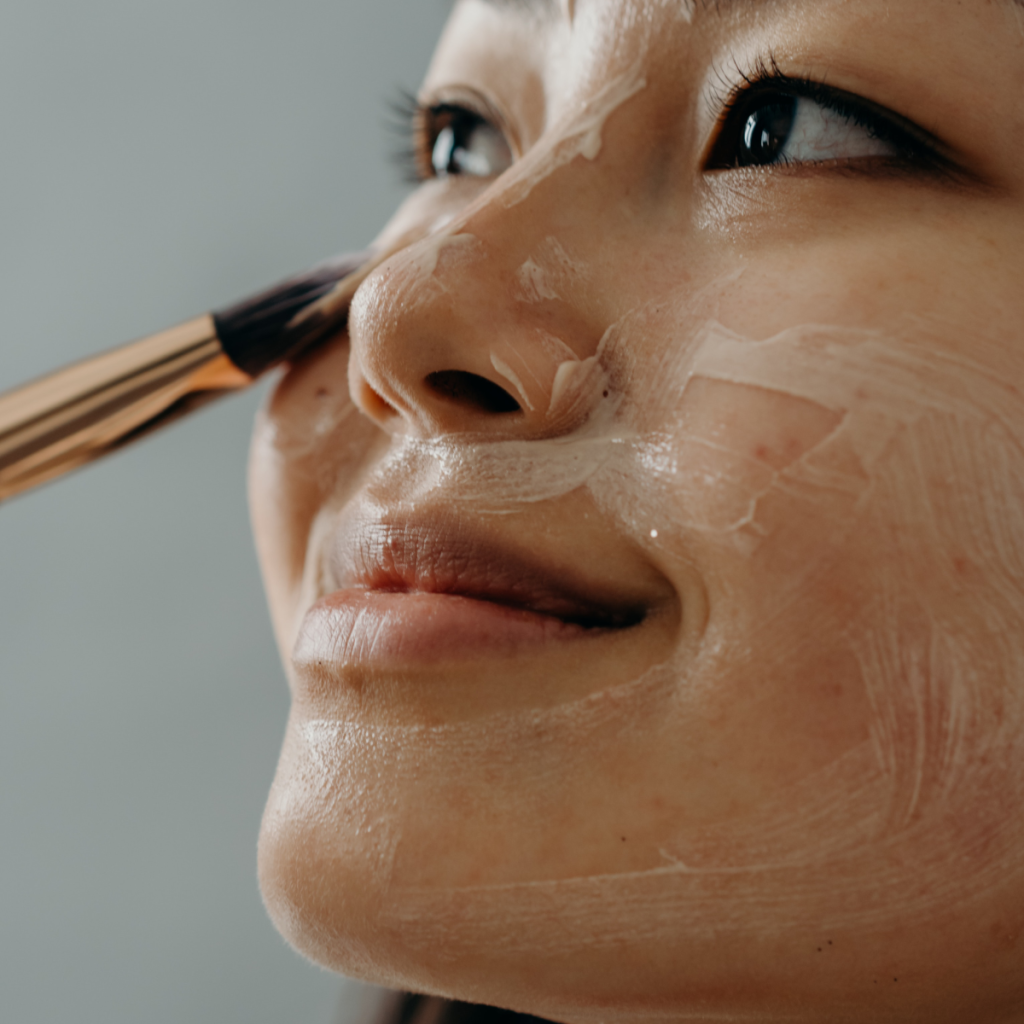Discover how your skin type influences the frequency of exfoliation.
How Does Your Skin Type Affect Exfoliation Frequency?
Exfoliation is an essential step in any skincare routine, but did you know that your skin type plays a crucial role in determining how often you should exfoliate? Understanding the basics of skin exfoliation and identifying your skin type can help you tailor your exfoliation routine to achieve maximum results. In this article, we will explore the different skin types and how they influence exfoliation frequency, as well as provide tips for effective and safe exfoliation. So, buckle up and get ready to exfoliate like a pro!

Understanding the Basics of Skin Exfoliation
Before delving into the world of exfoliation, it’s important to understand what it actually means. Exfoliation is the process of removing dead skin cells from the surface of your skin, revealing fresh and radiant skin underneath. It helps to unclog pores, improve skin texture, and promote cell turnover. Now that you know what exfoliation is, let’s dive deeper into why it’s so important for your skin’s health.
What is Exfoliation?
Exfoliation is like a reset button for your skin. It clears away the debris and buildup that accumulates over time, leaving your skin looking and feeling revitalized. It involves the use of physical or chemical exfoliants to slough off dead skin cells and promote the growth of new ones. Physical exfoliants typically contain granules or brushes that physically scrub away the dead skin cells, while chemical exfoliants utilize acids or enzymes to dissolve them.
When it comes to physical exfoliants, there are various options available. Some popular choices include sugar or salt scrubs, microdermabrasion, and exfoliating brushes. These physical exfoliants work by gently buffing away the outermost layer of dead skin cells, revealing a smoother and brighter complexion. On the other hand, chemical exfoliants, such as alpha hydroxy acids (AHAs) and beta hydroxy acids (BHAs), work by breaking down the bonds between dead skin cells, allowing them to be easily removed.
The Importance of Exfoliation for Skin Health
Exfoliation is not just about achieving a glowing complexion; it also plays a crucial role in maintaining overall skin health. By removing dead skin cells, exfoliation helps to prevent clogged pores, which can lead to acne breakouts. When dead skin cells accumulate on the surface of the skin, they can mix with oil and dirt, causing blockages in the pores. Regular exfoliation helps to keep the pores clear and minimize the chances of breakouts.
In addition to preventing acne, exfoliation also enhances the absorption of skincare products. When dead skin cells are present, they act as a barrier, preventing the active ingredients in your skincare products from penetrating deeply into the skin. By exfoliating regularly, you remove this barrier and allow your serums, moisturizers, and other products to be absorbed more effectively. This means that your skin can reap the full benefits of the products you use, resulting in healthier and more radiant skin.
Furthermore, exfoliation promotes collagen production, which is essential for maintaining youthful-looking skin. Collagen is a protein that provides structure and elasticity to the skin. As we age, collagen production naturally declines, leading to the formation of fine lines and wrinkles. However, regular exfoliation can stimulate collagen synthesis, helping to reduce the appearance of these signs of aging. By promoting collagen production, exfoliation can contribute to smoother, firmer, and more supple skin.
It’s important to note that while exfoliation offers numerous benefits, it’s crucial to find the right balance. Over-exfoliation can disrupt the skin’s natural barrier function and cause irritation. It’s recommended to exfoliate 1-3 times per week, depending on your skin type and the exfoliation method you choose. If you have sensitive skin, it’s best to opt for gentler exfoliants and avoid abrasive scrubs that can cause micro-tears in the skin.
In conclusion, exfoliation is a vital step in any skincare routine. It helps to remove dead skin cells, prevent clogged pores, enhance product absorption, and promote collagen production. By incorporating regular exfoliation into your skincare regimen, you can achieve healthier, smoother, and more radiant skin.
Identifying Your Skin Type
Now that you understand the importance of exfoliation, it’s time to identify your skin type. Knowing your skin type will help you determine the ideal exfoliation frequency and choose the right exfoliation products.
But why is identifying your skin type so important? Well, different skin types have different needs and react differently to various skincare products. By understanding your skin type, you can tailor your skincare routine to address specific concerns and achieve optimal results.

Characteristics of Different Skin Types
There are four main skin types: dry, oily, combination, and sensitive. Let’s take a closer look at each one:
- Dry skin: Dry skin tends to be flaky, rough, and lacking in moisture. It often feels tight and can be prone to fine lines and wrinkles. People with dry skin may experience discomfort and irritation, especially in harsh weather conditions.
- Oily skin: On the other end of the spectrum, oily skin is characterized by excessive sebum production. It appears shiny, feels greasy to the touch, and is prone to acne breakouts and enlarged pores. Oily skin can be challenging to manage, but with the right products and skincare routine, it can be balanced.
- Combination skin: Combination skin is a mix of dry and oily areas. The most common pattern is an oily T-zone (forehead, nose, and chin) and drier cheeks. People with combination skin often struggle to find the right balance between hydration and oil control.
- Sensitive skin: Sensitive skin is easily irritated and reactive. It may become red, itchy, or develop a rash in response to certain ingredients, environmental factors (such as extreme temperatures or pollution), or even stress. People with sensitive skin need to be cautious when choosing skincare products and opt for gentle, fragrance-free formulations.
How to Determine Your Skin Type
Determining your skin type is relatively simple. Here’s a step-by-step guide:
- Wash your face: Start by washing your face with a gentle cleanser suitable for all skin types. Avoid using harsh soaps or cleansers that may strip your skin of its natural oils.
- Pat it dry: Gently pat your face dry with a clean towel. Avoid rubbing, as it can cause irritation, especially if you have sensitive skin.
- Wait for about an hour: Give your skin some time to settle and return to its natural state. It’s best to perform this test when you have a free hour at home, so you can observe your skin without any external factors affecting it.
- Observe how your skin feels: After the waiting period, pay attention to how your skin feels. Here’s what to look for:
- If your skin feels tight, flaky, or itchy, you likely have dry skin. Dry skin may also appear dull and lackluster.
- If your forehead, nose, and chin appear shiny, you have oily skin. You may notice excess oil on these areas, and your skin may feel greasy to the touch.
- If you notice excess oil in the T-zone but the rest of your face feels dry, you have combination skin. Combination skin requires a targeted approach to address both dry and oily areas.
- If your skin becomes red, itchy, or develops a rash easily, you have sensitive skin. Sensitive skin requires gentle and soothing skincare products to avoid irritation.
Remember, our skin can change over time due to various factors such as hormones, climate, and aging. It’s essential to reassess your skin type periodically and adjust your skincare routine accordingly.
How Skin Type Influences Exfoliation Frequency
Now that you’ve identified your skin type, it’s time to determine how often you should exfoliate. While there are no hard and fast rules, here are some general guidelines to help you create an exfoliation schedule that suits your skin’s needs.
Exfoliation for Dry Skin
If you have dry skin, it’s important to approach exfoliation with caution. Dry skin is more prone to irritation, so opt for gentle exfoliation methods and limit the frequency to once or twice a week. Look for exfoliants with hydrating ingredients like hyaluronic acid or ceramides to help replenish moisture while removing dead skin cells.
Exfoliation for Oily Skin
Contrary to popular belief, having oily skin doesn’t mean you can exfoliate excessively. Over-exfoliating can strip the skin of its natural oils, leading to increased sebum production and potentially exacerbating acne. For oily skin, aim to exfoliate two to three times a week using oil-free exfoliants that help to unclog pores and control oil production.
Exfoliation for Combination Skin
Combination skin requires a balanced approach to exfoliation. Focus on the oilier areas of your face (usually the T-zone) and exfoliate two to three times a week. Use a combination of physical and chemical exfoliants to effectively address both dry and oily areas, while being mindful of potential irritation.
Exfoliation for Sensitive Skin
If you have sensitive skin, exfoliation might seem like a scary prospect. However, with the right products and gentle techniques, you can enjoy the benefits of exfoliation without irritation. Opt for mild exfoliants with soothing ingredients like chamomile or aloe vera. Start with once a week and observe how your skin responds. Gradually increase the frequency if your skin tolerates it well.
Tips for Effective and Safe Exfoliation
Now that you know how often to exfoliate based on your skin type, here are some additional tips to ensure your exfoliation routine is effective and safe.
Choosing the Right Exfoliation Products
When selecting exfoliation products, look for those specifically formulated for your skin type. Avoid harsh scrubs or products with irritating ingredients, such as alcohol or fragrance. Instead, opt for gentle exfoliants that promote skin renewal without causing damage or inflammation. Remember, gentle does not mean ineffective!
The Do’s and Don’ts of Exfoliation
Do exfoliate in gentle, circular motions. Don’t scrub your face aggressively, as it can cause micro-tears in the skin. Do follow up with moisturizer to hydrate and protect your skin’s barrier. Don’t forget to wear sunscreen, as exfoliated skin is more prone to sun damage. Incorporating these do’s and don’ts into your exfoliation routine will help you achieve the best possible results.
The Potential Risks of Over-Exfoliation
Exfoliation is undoubtedly beneficial for your skin, but just like anything in life, moderation is key. Over-exfoliation can lead to a host of problems, including further dryness, increased sensitivity, inflammation, and compromised skin barrier function. It’s essential to be aware of the signs of over-exfoliation and know how to treat it if it occurs.
Signs of Over-Exfoliation
If your skin feels excessively tight, sensitive, or appears red and irritated after exfoliating, these may be signs of over-exfoliation. You might also experience increased breakouts or excessive dryness. It’s crucial to listen to your skin and adjust your exfoliation frequency accordingly.
How to Treat Over-Exfoliated Skin
If you’ve over-exfoliated, don’t panic! Give your skin a break from exfoliation and focus on moisturizing and soothing it instead. Choose gentle skincare products with hydrating ingredients and avoid any potentially aggravating ingredients or treatments. It may take some time for your skin to recover, so be patient and let nature do its job.
By now, you should have a solid understanding of how your skin type affects exfoliation frequency. Remember, exfoliation is not a one-size-fits-all approach. Tailor your exfoliation routine to your unique skin type and listen to what your skin needs. With the right knowledge and a playful attitude, you’ll achieve that radiant, healthy glow you’ve always dreamed of. Happy exfoliating!





